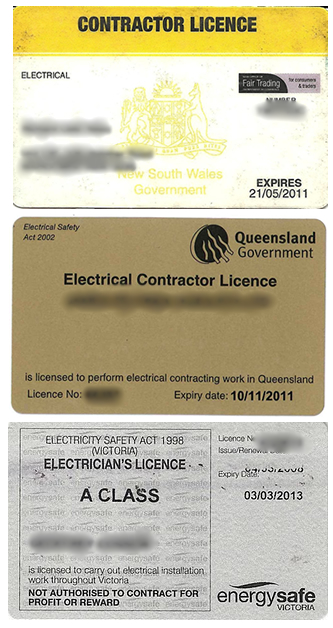
There’s a little more to choosing the right electrical contractor than just tracking someone down and throwing money at them to get the job over and done with. In fact, if you’re careless about who you hire or what you try to do yourself, it could easily end up burning your house down or really hurting someone.
It’s not all that complicated, but to protect your own interests there are a few things you should take into account when hiring an electrician. Consider the following:
- what sort of work is being done
- whether you need an electrician in the first place
- whether the electrician is licensed and registered as an electrical contractor
- where the electrician is based
- how reliable and trustworthy the electrician is
- what the electrician will charge for the job
When do I need an electrician?
We all know that electricians install and repair electrical systems. What you might not know, though, is just what kinds of electrical work you’ll need to call an electrician in for.
This is a pretty easy one – in Australia, you’re legally allowed to change your own light bulbs and operate your appliances in the manner for which they’re designed. For pretty much any electrical work beyond that, you’ll need to hire a qualified, licensed electrician.
This includes for small things like:
- installing a power point
- changing the plugs on an electrical appliance from overseas
- installing transformers for downlights
- fixing a broken fitting
Even if you think it’s basic and that you know what you’re doing, you’ll really need to call in an electrician. DIY electrical work can be really dangerous, and can result in damage, fire, injury or death – all of which you’ll be completely liable for if you haven’t used a qualified electrician.
A good electrician will work safely, to your state or territory's applicable electrical legislation, and to the standards set out in the Wiring Rules (Australian Standard AS/NZS 3000:2007).
What qualifications do electricians need?
These days, all states and territories require electricians to hold an electrical license to carry out electrical work (see the pictures above for a few examples). Most states also require electricians to be 'Registered Electrical Contractors' (R.E.C.s) before they're allowed to operate an electrical contracting business or perform electrical work for profit.
What’s a certificate of electrical compliance?
Electricians must issue certificates of electrical compliance for the work they do. These certificates indicate that the work that’s been done complies fully with the state or territory's applicable electrical legislation as well as the Wiring Rules (also known as Australian Standard AS/NZS 3000:2007) - and that the work's been properly tested and approved.
How to hire the right electrician
- Find a local electrician - This will be more convenient, and should ensure that you’re not being charged for the electrician to travel to the job.
- Get several quotes - Compare a few quotes, not all electricians will charge the same amount for the same work – but they should be reasonably similar. Check out reviews online, but don’t believe everything you read…
- Check with other trusted contractors – If you’re having a kitchen renovated, there’s a good chance that the builder will know a good electrician who he or she’s comfortable working with. Get it all bundled in the one price, if you can.
- Ask to see the electrician’s licence – Your electrician should have no problem with showing you this – or with you double-checking with the state authority to ensure that the licence is valid.
- Ask whether you will get a certificate of electrical safety – You should receive safety certificates for any work that’s done.
If the electrician won’t give you a certificate or show you a licence, look elsewhere! And if you’re not sure about any of the above, get in touch with your local state regulator for more information. They’ll normally be more than happy to help.
Electrical licensing and regulators by state
- ACT - www.actpla.act.gov.au
- New South Wales - www.fairtrading.nsw.gov.au
- Northern Territory - www.worksafe.nt.gov.au
- Queensland - www.worksafe.qld.gov.au
- South Australia - www.technicalregulator.sa.gov.au
- Tasmania - www.justice.tas.gov.au/licensing_and_accreditation/electricial_professionals
- Victoria - www.esv.vic.gov.au
- Western Australia - www.energysafety.wa.gov.au

